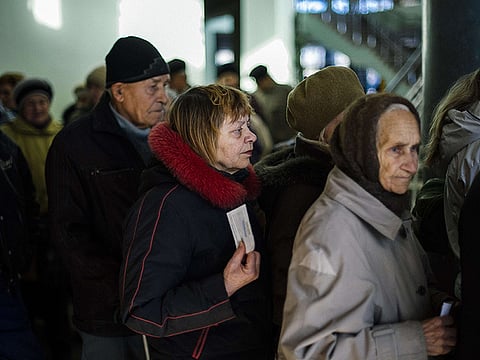Hungry, cash-strapped Donetsk residents queue for food parcels
Acute shortage of food in rebel-held region in eastern Ukraine

Donetsk, Ukraine: Outside the iconic football stadium in Donetsk in eastern Ukraine, Yulia holds her four-year-old son Maxim by the hand as they wait for the food parcels to arrive.
“I’ve never come to get humanitarian aid before. I was living off my stored supplies, but I don’t have anything left,” says Yulia, 30, who lost her job when her company closed down at the start of the conflict between pro-Russian rebels and Ukrainian troops.
In a sign of the acute desperation for food in this rebel-held region, people began queuing for the aid around 5am — even though the distribution was not due until four hours later.
Around 600 people are gathered outside the ticket booths of the Donbass Arena, home stadium of Shakhtar Donetsk, winner of numerous Ukrainian championships.
These days, the stadium is closed and has suffered some shelling damage. Instead of tickets, the booths now issue receipts that grant the holder a parcel of humanitarian aid.
The parcels are organised by local oligarch Rinat Akhmetov, who owns the stadium and the football team, and controlled much of the region’s economy before the conflict began in April. He hesitated before ultimately deciding to back the Kiev government.
In the crowd, several women lament that they do not qualify for the food aid.
“We come from Makiivka (a town adjoining Donetsk). Our mayor refuses Akhmetov’s aid because he says he is our enemy,” says Tatyana, a 35-year-old mother of three, with tears in her eyes.
“He doesn’t care that my children have nothing to eat. And when I got here, they told me the aid is only for families from Donetsk.”
A young couple pushing a baby in a stroller open their package.
“Nappies for the baby, pots of puréed baby food, fruit juice, some porridge oats ... This can last us a month!” says the baby’s father Viktor, 28, joyfully, adding that the supplies they stocked up at the start of hostilities quickly ran out.
“Our foundation is the only one working full-time in Donetsk and in other towns,” says Mykola Ivashchenko, a 44-year-old coordinator of Akhmetov’s foundation. He is glad the rebel authorities in the city agreed to work with them.
In another part of the city, outside the large building of the state circus, Akmetov’s foundation is giving out aid to pensioners, the disabled, and those who have lost their homes in the shelling.
“We give out food aid to around 1,400 people per day. We started on August 29 and more than a thousand volunteers are taking part in this operation at the moment,” says 28-year-old Maria, helping to give out the parcels.
No one seems to have heard of any humanitarian aid coming from Russia or elsewhere.
“As usual, with the corruption we have here, it all gets stolen,” says an elderly woman in the queue.
That is despite claims from the rebel authorities in Donetsk that those who steal or resell humanitarian aid will be killed.
“We will shoot those monsters who are growing fat on the misfortune of others,” the prime minister of the self-proclaimed Donetsk People’s Republic, Alexander Zakharchenko, announced recently.
In the meantime, people like Svitlana, 50, depends on the food parcels from the rebels’ enemies, given out twice a month. Hers contains tins of fish, a can of condensed milk, some vegetable oil, sugar, tea and cereals.
“It’s lucky that we get this aid,” she says. “Thanks to this, we haven’t died of hunger, since we haven’t been paid our salaries or pensions for four months.”
Sign up for the Daily Briefing
Get the latest news and updates straight to your inbox



